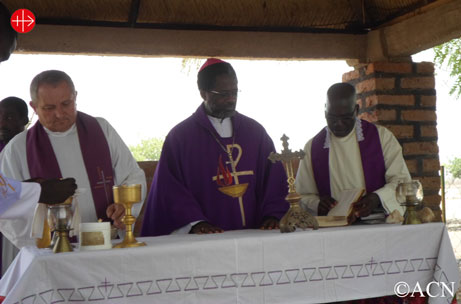CAMEROON
Bishops condemn ‘monstrous violence’
The Catholic bishops of Cameroon have issued an urgent plea signed by Monsignor Samuel Kleda, President of the Cameroon Bishops’ Conference, following the brutal army crackdown against an independence movement in English-speaking regions of Cameroon.
The escalating humanitarian crisis that resulted is described by the bishops as a situation “marked by blind, inhumane, monstrous violence and a radicalization of positions that alarms us.”
In their statement, the bishops plead for an end to violence: “Let us stop all forms of violence and cease killing each other… Let us save our country, Cameroon, from a baseless and futile civil war.”
The call for both sides to dialogue as a way out of the security crisis in Cameroon’s Anglophone region has been reiterated by the Bishops: “We, the Bishops of Cameroon, believe that a process of mediation must now be imposed to find a way out of the crisis… We are all brothers and sisters.”
The international movement Crisis Group has identified the church as the most potent political mediator between the government and separatist elements. Its 26 April report titled “Cameroon’s Anglophone Crisis: How the Catholic Church Can Promote Dialogue” stated that the clergy needed to unite with a strong common position in order to be seen as credible mediators.
In an interview with the BBC, Bishop of Mamfe in the southwest region, Andrew Nkea, spoke at length about the harrowing experiences that bishops went through during a tour of burnt down regions in the violence-hit parts of the Anglophone regions – Northwest and Southwest. The bishop stressed that violence has been on both sides – while the army was burning down entire villages, the separatists were also burning down schools and other state institutions.
Caritas workers in Mamfé, south-western Cameroon, at the epicentre of the Anglophone crisis report “Not a week goes by without houses being burned down, people kidnapped or killed. Fear has taken over this territory.” 45,000 people in the diocese have been displaced, leaving behind ghost villages.
“The security situation is incredibly precarious and most people instead of working in their fields have fled their burned houses to hide in the bush,” observed Hippolyte Sando of Caritas. A refugee from south-west Cameroon now living in Nigeria, said “Soldiers are burning villages. People are living in the bush. If you even walk up to the roadside you can be shot.”
Cameroon’s former French and British territories have been riled by armed violence between government and secessionist forces. In October 2017, activists in the English-speaking minority regions, which represent 20 percent of the population, declared a so-called independent Ambazonia Republic, in defiance of the French-dominated government of President Paul Biya.
The crisis is under-reported, with no journalists being allowed into conflict areas, but at least 150 people including 64 civilians are thought to have been killed so far in running battles between the army and separatists.
160,000 people are displaced in Cameroon and at least 26,000 fled into Nigeria but the total may be 40,000, according to the UN. Four-fifths are women and children. Only five in 100 refugees have proper shelter, the rest sleeping rough in abandoned buildings or out in the open.
Eyewitnesses report constant shootings deaths and kidnappings were still taking place in the areas of Mamfé, Limbe, Buea, and Nisan Aragaki. As Caritas Mamfé wrote: “In these conditions, going back home would be suicide. The situation remains tense and gives no sign of better days ahead.”
Nigeria’s bishops, while urging tolerance, warn that the refugee influx in Cross River, Taraba, Benue and Akwa-Ibom states is compounding the poverty of local communities. “We are lacking food, shelter, clean drinking water,” said one Nigerian village leader. “People are sick and dying.”





